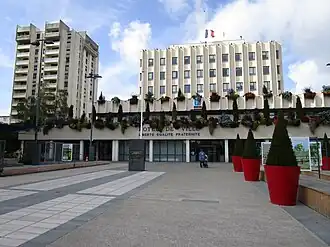Hôtel de Ville, Joué-lès-Tours
| Hôtel de Ville | |
|---|---|
 The main frontage of the Hôtel de Ville in September 2019 | |
| General information | |
| Type | City hall |
| Architectural style | Brutalist style |
| Location | Joué-lès-Tours, France |
| Coordinates | 47°21′04″N 0°39′41″E / 47.3511°N 0.6615°E |
| Completed | 1976 |
| Design and construction | |
| Architect(s) | André Remondet |
The Hôtel de Ville (French pronunciation: [otɛl də vil], City Hall) is a municipal building in Joué-lès-Tours, Indre-et-Loire, in central France, standing on Place François Mitterrand.
History
Following the French Revolution, the town council initially met at the home of the mayor at the time. This arrangement continued until 1843, when the council decided to commission a dedicated town hall. The site they selected was on a square now known as Place du Général Leclerc. The new building was designed in the neoclassical style, built in brick with a stucco finish and was completed in 1848.[1]
The design involved a single-storey main frontage with five recessed openings facing onto the street. The central opening contained a doorway, while the other openings contained round headed windows. The building was increased in height when an extra floor was added in 1909. The extra floor was fenestrated by five square-headed casement windows and surmounted by a cornice with five curved pediments above. Internally, the principal rooms included a cell for incarcerating petty criminals.[2] After being vacated by the council in 1976, the building was converted for use as the local police station and was notable as the venue for the stabbing of three policemen on 20 December 2014.[3][4][5]
In the early 1970s, after significant population growth, the town council led by the mayor, Raymond Lory, decided to commission a modern town hall. The site they selected, on the west side of Rue Gamard, formed part of a larger project to develop the town centre.[6] The new building was designed by André Remondet in the brutalist style, built in concrete and glass, and was officially opened by the president of the Senate of France, Alain Poher, on 11 December 1976.[7]
The design involved a four-floor tower sitting on a two-storey podium. The podium featured a plate glass frontage on the ground floor, and a narrow band of windows on the first floor. The main frontage of the tower was faced with alternating bands of concrete and dark-framed windows; full-height concrete slats were installed on either side of the windows. Internally, the principal rooms, both of which were lined with fine wood, were the Salle des Mariages (wedding hall) and the Salle du Conseil (council chamber), which featured a large oval table.[8]
In February 2010, following an inspirational speech by the president of France, Nicolas Sarkozy, on laïcité positive (positive secularism), the mayor, Philippe Le Breton, ordered that the new inscription "laïcité" (secularism) be added to the existing inscription "liberté, égalité, fraternité" (liberty, equality, fraternity) on the face of the town hall.[9] There was considerable opposition to this development and, after Frédéric Augis was elected mayor in April 2014, the new inscription was removed.[10]
An extensive programme of works, involving replacement of the lifts at a cost of €220,000 and replacement of the window frames at a cost of €470,000, was initiated in December 2011.[11]
References
- ^ "Joué-lès-Tours: partez à la découverte du patrimoine du centre-ville". La Nouvelle République. 6 June 2022. Retrieved 12 August 2025.
- ^ "Parcours du patrimoine Jocondien" (PDF). Town of Joué-lès-Tours. Retrieved 12 August 2025.
- ^ Lichfield, John (21 December 2014). "Man shot dead by police in jihadist attack in Tours". The Independent. Archived from the original on 1 October 2015.
- ^ "French police shoot dead knifeman who was shouting Islamic slogans". The Daily Telegraph. 20 December 2014. Retrieved 12 August 2025.
- ^ Rodrigues, Jason (16 January 2015). "Terror attacks in Europe: the five danger zones". The Guardian. Retrieved 12 August 2025.
- ^ "Joué-lès-Tours: un bond de soixante ans en arrière, quand la ville s'est métamorphosée". La Nouvelle République. 9 October 2023. Retrieved 12 August 2025.
- ^ "On vous fait visiter l'hôtel de ville de Joué-lès-Tours". La Nouvelle République. 12 May 2018. Retrieved 12 August 2025.
- ^ "Joué-lès-Tours: le nouveau conseil des aînés installé". La Nouvelle République. 24 January 2018. Retrieved 12 August 2025.
- ^ "Le maire PS de Joué-lès-Tours a fait apposer la semaine dernière la mention "laïcité" sur son fronton". France.info. 23 February 2010. Retrieved 12 August 2025.
- ^ "Joué-les-Tours: le mot laïcité n'est plus écrit sur le fronton de la mairie". France Bleu. 12 February 2015. Retrieved 12 August 2025.
- ^ "Travaux à l'hôtel de ville après des années de bons et loyaux services..." (PDF). Town of Joué-lès-Tours. 1 November 2011. Retrieved 12 August 2025.